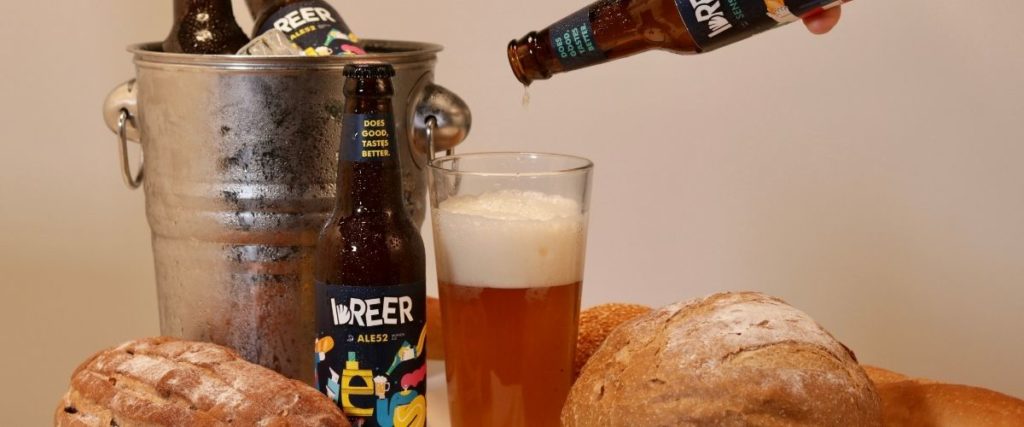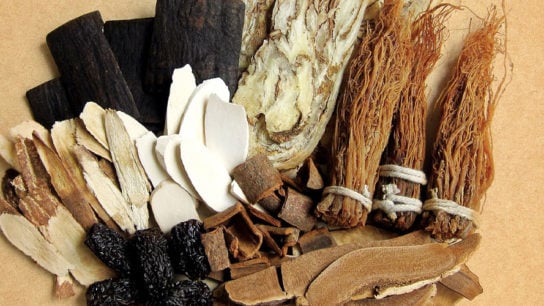Hive Life caught up with Anushka Purohit, the co-founder of food upcycling startup Breer, who walked us through the production process of their delicious craft beer and how they are reducing food waste in the +852.
Aiming to reduce food waste in Hong Kong, Breer fuses craft beer with waste bread to create irresistibly delicious- and sustainable- brews! The food upcycling startup was founded by a team of four students from HKUST: Anushka Purohit, Naman Tekriwal, Deevansh Gupta, and Suyash Mohan. With two lines released already- a bread beer line and the world’s first pizza crust beer line- we speak to 20 year old Anushka who tells us how Breer is changing the future of food waste solutions and brewing a new brand of craft beer.

Can you tell us a little bit about Breer?
Breer is a food upcycling startup and what we do is collect unsold, uneaten surplus bread from bakeries and restaurants around Hong Kong, which we then use to brew locally crafted beer.
My teammates and I wanted to take part in our university’s social innovation competition called Enactus and in order to do so we needed a problem and a solution to that problem, which at that time we didn’t have.
Ironically, the day our exams ended we headed to the bakery to celebrate in the late evening. Since the bakery was about to shut, the baker was throwing away a day’s waste of bread and then it clicked with us – food waste is a massive problem in Hong Kong. But, what could we do about it?
Fast forward to one week later – the four of us headed to Lan Kwai Fong to celebrate properly. While we were there, one of us was downing a beer. That’s when the idea struck and Breer was born in the middle of a pandemic, August 2020.
We did some strong research, pitched this idea to Enactus and ended up winning!
Tell us about your experience as a pandemic-founded business.
If you looked at the beer market during the early stages of the pandemic, there were a lot of changes taking place. People weren’t going to bars or restaurants. It was more about picking a bottle from 7/11 and heading home which is very difficult for a lot of breweries because they were used to putting their beer into kegs and supplying bars and restaurants. And that was it – that was their main source of income. However, all of a sudden, that was taken away and you really had to pivot – either start supplying cans or bottles, and solely rely on that. That’s a little insight on how the market was doing when we first started Breer.
What made it even more difficult was the fact that we were all students. Additionally, when we first started, the entire team was in different parts of the world which meant carrying out all of our meetings on Zoom. Ironically, our first and last ever face-to-face meeting was at Enactus.
We started off Breer as a fun side project and because we didn’t put that much pressure on ourselves, we didn’t realise when we transitioned from being just a project into a business.
As students, we get access to a lot more grants, competitions, and networking opportunities in comparison to when you enter an industry, which definitely helped us tremendously.

Can you share about your experience launching your first batch?
We worked with a local brewery in Hong Kong and got them to brew us a batch. It was surreal. We were so excited to see what would potentially happen. I believe that the biggest road fall for a lot of startups is the phase between ideation and actual implementation, and to reach a point where you are able to create something is a huge booster. That’s how it worked for us. We knew it was only upwards from this point. We could improve the recipe, experiment with different flavours, and keep improvising.
Ironically, before Breer launched I knew more about beer from a chemical perspective. I never really found a true calling for it because I wasn’t really that avid of a drinker. Now that we understand the craft, you suddenly just respect the beverage so much more! It’s not just putting a bunch of things together and making a drink. It’s about thinking and ideating. There’s always a story involved. The whole team’s choice of drinks has definitely shifted from whatever it was before to beer – especially knowing that we can always incorporate what we like into it.
What were the steps the team took to perfect the flavours?
The whole team took an online brewing masterclass to understand how it works. We also got a consultant on board who was a full-time brewer who helped us with innovating our recipes and teaching us how to come up with the best beer. It was difficult but we really wanted it to work.
Today, we produce our beers in different batches. We come down to a singular body bottle level because we have QR codes on each bottle that provides you with information about that specific bottle and the environmental difference it has made to the world.
However, brewing beer is actually pretty simple. It’s made of three different elements: hops, barley, and malt. Hops are what gives the beer the flavour, and barley is the main element, almost 78% of a brew. So what we do is we just take the bread and use that to replace the barley and the malt- and hops go in, as well.
We alter the amount of hops that go in or the types so that they match profiles. Our goal is to come up with different beers for literally every taste profile – whether it’s a lighter tasting beer, a strong beer, or a fruity beer – we have it all. We also have the Pizza Crust Beer – which by the way is the world’s first! The aim is reducing wastage whilst turning it into something as cool as beer.

Breer is a part of the solution for global food waste. Why is this important for you and your team? And why is it important that we combat food waste?
For starters, I think nobody realises how big of an impact food wastage has – especially in Hong Kong. Our city wastes 3,600 tonnes of food every single day; 47% of a store’s food waste is just leftover bread. That’s a lot of wasted food!
What’s more shocking is that Hong Kong’s landfill capacity was expected to be completely exhausted by the end of 2020. So luckily, we somehow sailed through that year, but if that day comes it’s going to mean so much more negative impact on our environment. This is going to end up in our city having to decide to burn a lot of trash which is obviously not good. It’s a spiral that once we fall into it, is terribly difficult to come out of.
What are some ways you think we can fight food waste in Hong Kong?
It’s important that we all understand sustainability and be open to the concept of reducing food wastage. In the west, the culture they follow is whatever doesn’t get sold today, we will sell again tomorrow for a cheaper price. However, this doesn’t work in Hong Kong. Everybody wants freshly made items. Moreover, people here have the spending capacity to pay a little more to enjoy the freshness. If people realise that this problem exists and give it as much importance as it deserves to have, we will already be making a difference.

What differentiates Breer from other craft beer companies around Hong Kong?
Our tagline for Breer is “does good, tastes better.” While we are a company that is trying to incorporate sustainability and make a difference, our main selling point is that we still produce good beer that people want to drink. A lot of the time when people try our beer, they’re pleasantly surprised with the taste because they have this expectation of it tasting like bread, or there might be chunks in it. And if it’s the pizza crust beer, they have this visual that it’s going to taste like tomato and cheese!
It makes us really happy that we’re able to integrate an unfamiliar flavour into beer which still tastes good. Nobody’s going to buy a beer just because they want to support a mission over and over again – maybe they’ll do it the first time, but after that it’s truly down to whether they like the beer or not. That’s a huge unique selling point for us – that we’re able to come up with a unique taste that people haven’t tried before, and still have it taste like good beer.
Can you tell us a little more about the Breer app?
The app is still a work in progress! Essentially, its goal is to connect all of the stakeholders we are involved with. We follow a similar model to Feeding Hong Kong. We have volunteers who are students who help us go to different bakeries and restaurants to collect bread which they then drop off at our storage facilities or brewers for it to be brewed into beer.
By using the app, I can create my own to-do list which is being seen by relevant stakeholders which makes it a more efficient way to communicate with them! The goal is to create a supply chain ecosystem on the app. In the future, we definitely want to evolve that into having a loyalty club with a reward system – making it a lot more interactive for our community of beer lovers.

Let’s talk a little bit about you, Anushka! Other than Breer, what other businesses have you founded?
There’s another startup I’m working on! It’s a local startup called Stayktreat where I am the Chief Technology Officer. Essentially, the goal is to compile all of Hong Kong’s hidden gems into one platform so no one’s missing out on them. Our team realised there was a huge gap in the amazing offerings our city has.
How do you manage to do everything at once – since you’re still a student at university?
With university on one side and running businesses on the other – the drive for me comes from the fact that I really, really enjoy what we’ve founded.
From a young age, it was always instilled in me that, if you do something you love, it makes doing the job so much easier. I never really believed them until I started both Breer and Stayktreat! There would be instances where I would be studying for my exams and my motivation to get through it would be that I can go back and see what’s happening in my businesses. Or I can go back and get on a call with the other founders. I’m so excited to see what we can do next with these two projects and I hope you are, as well!
Related Articles
Homebrewing: A Revolution Against Big Beer Dominance
Beer Pairing Meets Fine Dining
Wishbeer: How One Craft Beer Enthusiast Created a Retail Sensation





